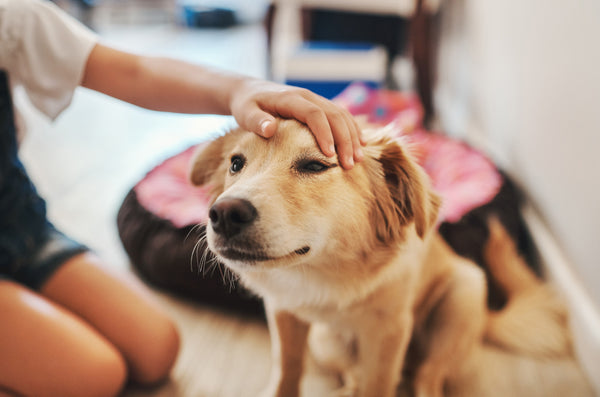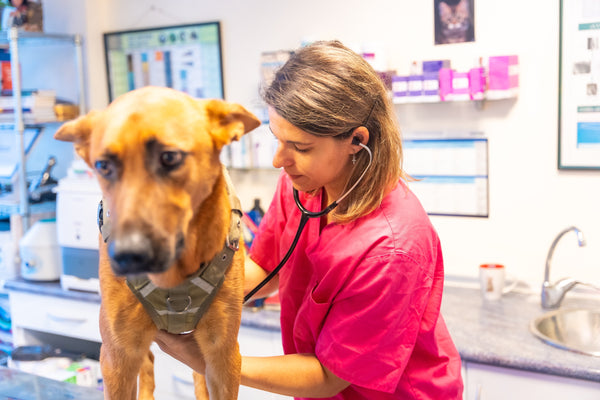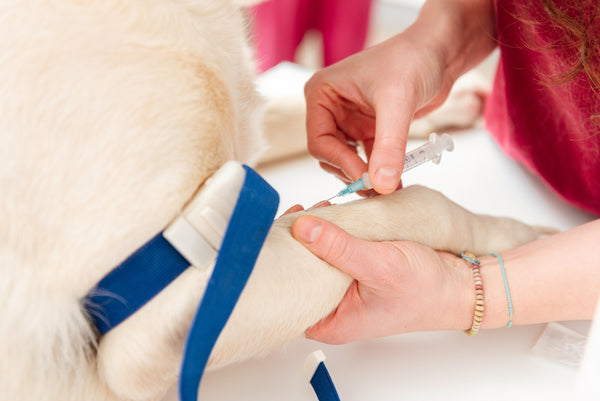Our canine companions are beloved members of our families, and when they start coughing, it's natural to worry. A dog's cough is not always just a passing annoyance; it can indicate serious health issues or simple irritants.
This comprehensive guide will explore the various types of dog coughs, common causes when to seek veterinary care, home remedies, and how to prevent your dog from developing a persistent cough.
Types of Dog Coughs
Just as in humans, there isn't a one-size-fits-all explanation for a dog's cough. Here's what you need to know about the different kinds of coughs you might hear from your pup:
Wet Cough
Also known as a productive cough, a wet cough is characterized by the presence of mucus or phlegm. The mucus can come from the nose, throat, or lungs and may be white, yellow, green, or even tinged with blood. In more serious cases, a wet cough can also be a sign of heart disease in dogs.
Dry Cough
A dry cough is non-productive and typically sounds like a honking or hacking noise. This type of cough is often caused by irritants such as dust, smoke, or allergies. In more serious cases, it can also be a symptom of tracheal collapse, a condition where the cartilage in a dog's trachea weakens and narrows, making it difficult for them to breathe.
Honking Cough
A honking cough, also known as a goose-honk or whooping cough, is a characteristic sound of kennel cough. This type of cough is usually seen in environments where dogs are in close contact with one another, such as dog parks or boarding facilities.
Coughing Fits
Coughing fits are episodes of rapid and intense coughing that can last for several minutes. They may be caused by a foreign object lodged in the throat, or heart disease. Coughing fits can also be a symptom of Canine Infectious Respiratory Disease Complex (CIRDC), a contagious respiratory infection commonly seen in shelters or crowded living conditions.

Reverse Sneeze
While not technically a cough, a reverse sneeze is a common respiratory reflex in dogs. It sounds like the dog is gasping for air or choking and may last for several seconds. It can be triggered by excitement, allergies, or even a simple tickle in the throat. While it can be alarming for pet owners, reverse sneezing is typically harmless and does not require treatment.
Common Reasons Dogs Cough
Why do dogs cough? Coughing can be a symptom of various conditions, both minor and severe. Here are some common reasons:
Kennel Cough
Kennel cough, also known as infectious tracheobronchitis, is a highly contagious respiratory infection caused by a combination of viruses and bacteria. It is often seen in dogs that have been in close contact with other infected dogs, hence the name "kennel" cough. It can be easily treated with antibiotics and supportive care.
Heart Disease
Coughing can also be a symptom of heart disease in dogs, particularly in older or overweight dogs. As the heart struggles to pump blood effectively, fluid can accumulate in the lungs, leading to coughing and difficulty breathing. Treatment for heart disease may include medication and dietary changes.
Allergies
Just like humans, dogs can suffer from allergies that irritate their respiratory system and cause them to cough. These allergies can be triggered by pollen, dust, mold, or other environmental factors. Your veterinarian may prescribe antihistamines or recommend allergy testing and immunotherapy.
Infections
Various bacterial or viral infections can also lead to coughing in dogs.If your dog is exhibiting other signs of illness, such as fever or lethargy, it's essential to seek veterinary care.
Foreign Objects
Dogs are curious creatures and may accidentally eat or inhale foreign objects that can get stuck in their throat or airway. This can lead to coughing fits as the body tries to expel the object. If you suspect your dog has ingested something, contact your veterinarian immediately.
When to Seek Veterinary Care
It's important to recognize when your dog's cough might need professional attention. Here are signs that should prompt a visit to the vet:
Persistent Cough
If your dog has been coughing for more than a week, it's time to seek veterinary care. A persistent cough can be a sign of an underlying health issue that will require treatment.

Difficulty Breathing
A dog that is struggling to breathe needs immediate medical attention. Coughing may accompany difficulty breathing, and both symptoms can indicate a severe respiratory condition or heart problem.
Coughing up Blood
Anytime you see blood, it's a cause for concern. If your dog is coughing up blood, they need to be seen by a veterinarian right away.
Other Symptoms
If your dog is also exhibiting other symptoms such as fever, lethargy, loss of appetite, or vomiting, it's essential to seek veterinary care. These can be signs of a more severe condition that requires medical treatment.
Home Remedies and Care
While some coughs may require veterinary treatment, you can offer home remedies to your dog for mild coughs:
Proper Hydration and Nutrition
Ensuring your dog has access to clean water and a balanced diet can help boost their immune system, making it easier for them to fight off infections that may cause coughing.
Moreover, a lot of dog owners choose to boost their dog's immunity through supplements such as multivitamins, probiotics, and omega-3 fatty acids.
Steam Treatment
Similar to a humidifier, steam can help loosen any mucus or phlegm in your dog's airways. You can create a steam room for your dog by sitting with them in a bathroom filled with hot water from the shower. Just ensure your dog doesn’t come into contact with the hot water.
Calming Environment
Keeping a calm and quiet environment can reduce stress, which can sometimes be a factor in chronic coughing. While creating a calm environment externally is one thing, creating one internally is another. Consider incorporating calming chews in your dog's diet to help soothe them from the inside out.
Honey
Honey has natural antibacterial properties and can help soothe an irritated or sore throat. You can give your dog a small amount of honey, or mix it with warm water to create a soothing drink.

Preventing Dog Coughs
Prevention is always better than cure. Here are steps you can take to minimize your dog's risk of coughing episodes:
- Regular vaccinations: Vaccinating your dog against diseases like kennel cough can significantly reduce the risk of coughing illnesses.
- Regular grooming: Proper grooming can prevent your dog from inhaling allergens that might cause coughing, as well as alert you to skin or coat issues before they escalate.
- Healthy Environment: A clean living environment, free from smoke, chemical odors, and excessive dust, can reduce irritants that lead to coughing.
- Heartworm Prevention: Regular heartworm prevention can protect your dog from one potentially serious cause of coughing.
FAQs
Q: What is reverse sneezing?
Reverse sneezing is a common condition in dogs where they inhale rapidly and forcefully through their nose, making a snorting sound. It can be triggered by irritants or excitement and is usually harmless.
Q: When should I take my dog to the vet for coughing?
If your dog's cough persists for more than a week, is accompanied by other symptoms, or you are concerned about their health, it's best to visit the veterinarian for a proper diagnosis and treatment plan.
Q: Can I give my dog over-the-counter cough medicine?
No, it's never safe to give your dog any medication without consulting your veterinarian first. Some medications can be harmful or even fatal to dogs, especially young puppies, so it's crucial to seek professional advice before administering any drugs. However, you can offer home remedies to your dog for mild coughs.
Q: Can my dog catch my cold or flu?
No, dogs cannot catch human colds or flu. However, they can contract certain respiratory infections from other dogs or animals. It's essential to keep your dog away from sick animals and maintain their vaccinations to prevent these illnesses.
Q: How can I tell if my dog has allergies?
Symptoms of allergies in dogs include coughing, sneezing, nasal discharge, itchy skin, and irritated eyes. If you suspect your dog has allergies, consult with your veterinarian for a proper diagnosis and treatment plan.
Conclusion
Your dog's coughing can be an uncomfortable symptom for both pets and their owners. With this guide, you should feel more equipped to handle and understand your dog's cough. Remember, each cough is telling you something, and it's important to listen.
Whether it's simply a mild irritation or a sign of a more severe condition, staying informed and seeking professional advice when needed is the best care you can offer your loyal friend. Keep this guide in your back pocket, and share it with other pet owners to spread knowledge and help keep all dogs healthy and happy.






